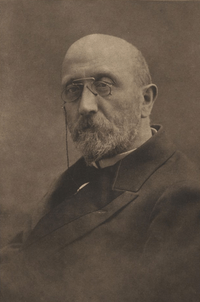Samuel Abraham Poznański
Samuel Abraham Poznański or Shemuel Avraham Poznanski ( Hebrew: שמואל אברהם פוזננסקי, Lubraniec, 3 September 1864–1921) was a Polish-Jewish scholar, known for his studies of Karaism and the Hebrew calendar. Arabist, Hebrew bibliographer, and authority on modern Karaism; rabbi and preacher at the Great Synagogue in Warsaw.

He graduated from a gymnasium of Warsaw and studied at Warsaw University and the Hochschule für die Wissenschaft des Judenthums in Berlin.[1] At that time he formed an intimate friendship with his teacher Moritz Steinschneider, for whose eightieth birthday in 1896 he edited the Festschrift.
He was appointed a member of the Warsaw council of rabbis by a committee of the Great Synagogue on Tłomackie Street, Warsaw just before his death where he preached. Orthodox Jews opposed his appointment and even resorted to street demonstrations.[2][3] He was succeeded at the Great Synagogue by Moses Schorr in 1923.
He was an ardent Zionist, and a delegate to the First Zionist Congress.
Writings
Poznanski is the author of the following works:
- "Eine Hebräische Grammatik des Dreizehnten Jahr-hunderts" (Berlin, 1894);
- "Mose b. Samuel ha-Kohen ibn Chiquitilla Nebst den Fragmenten Seiner Schriften" (Leipsic, 1895); *"Isak b. Elasar ha-Levis Einleitung zu Seinem Sephath Jether" (Breslau, 1895);
- "Aboul Faradj Haroun ben al-Faradj le Grammairien de Jürusalem et Son Mouschtamil" (Paris, 1896); * "Die Girgisani-Handschriften im British Museum" (Berlin, 1896);
- "Karaite Miscellanies" (London, 1896);
- "Mesroi al Okbari, Chef d'une Secte Juive du Neuvième Siècle" (Paris, 1896);
- "The Anti-Karaite Writings of Saadjah Gaon" (London, 1897);
- "Jacob ben Ephraim, ein Anti-Karäischer Polemiker des Zehnten Jahrhunderts" (Breslau, 1900, in "Kaufmann Gedenkbuch");
- "Perush R. Sa'adya Gaon le-Dani'el" (Berdychev, 1900);
- "Tanhoum Yeruschalmi et Son Commentaire sur le Livre de Jonas" (Paris, 1900); "Miscellen über Saadja III.: Die Beschreibung des Erlösungs-Jahres in Emunoth we-Deoth ch. 8" (Breslau, 1901);
- "Tehillah le-Dawid" (Kaufmann) in Hebrew (Warsaw, 1902);
- "Le Commentaire sur le Livre d'Osée par Eliezer (ou Eléazar) de Beaugency" (Berdychev, 1902);
- "Anan et Ses Ecrits" (Paris, 1902);
- "Der Arabische Kommentar zum Buche Josua von Abû Zakarjâ Jahjâ Ibn Bal'am" (Frankfort-on-the-Main, 1903);
- "Ephrajim ben Schemarja de Fostât et l'Académie Palestinienne" (Paris, 1904);
- "Schechters Saadyana" (Frankfort-on-the-Main, 1904);
- "Fragments de l'Exegèse Biblique de Menahem bar Chelbo" (Warsaw, 1904);
- "Ibn Hazm über Jüdische Sekten" (London, 1904).
He has contributed also numerous articles to the "Monatsschrift," Stade's "Zeitschrift," "Ha-Goren" (Berdychev), "Ha-Ẓefirah" (Warsaw), "Revue des Etudes Juives," and the "Jewish Quarterly Review".
References
- Samuel Poznanski (Jewish Encyclopedia, 1906)
- Édité par le comité de la Grande Synagogue à Varsovie. Livre d'Hommage à la mémoire du Dr Samuel Poznanski (1864-1921) offert par les amis et les compagnons du travail scientifique (Book of Tribute to the Memory of Dr. Samuel Poznanski (1864-1921) offered by his friends and companions in scientific work). Warsaw 1927, rep. Jerusalem 1969.
- R. Zebrowski, "Modernization or an attempt to divide the community? Battle for the appointment of a progressive rabbi in Warsaw" Archived 2007-09-29 at the Wayback Machine (abstract)
External links

- Important Persons in Karaim History
- Solomon Schechter. Letters to Samuel Poznanski (in Hebrew, 1943).
Bibliography
- G. Kressel (Getzel Kressel), Cyclopaedia of modern Hebrew Literature (Leksīqōn has-sifrūt hā'ibrīt be-dōrōt ha-aharōnīm), vol. II, 1965, (Hebrew).
- Encyclopaedia Judaica, vol.13, 929 - 930.